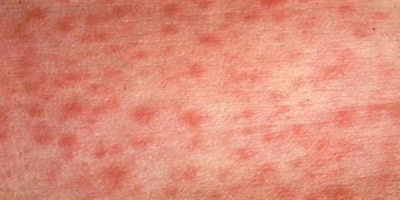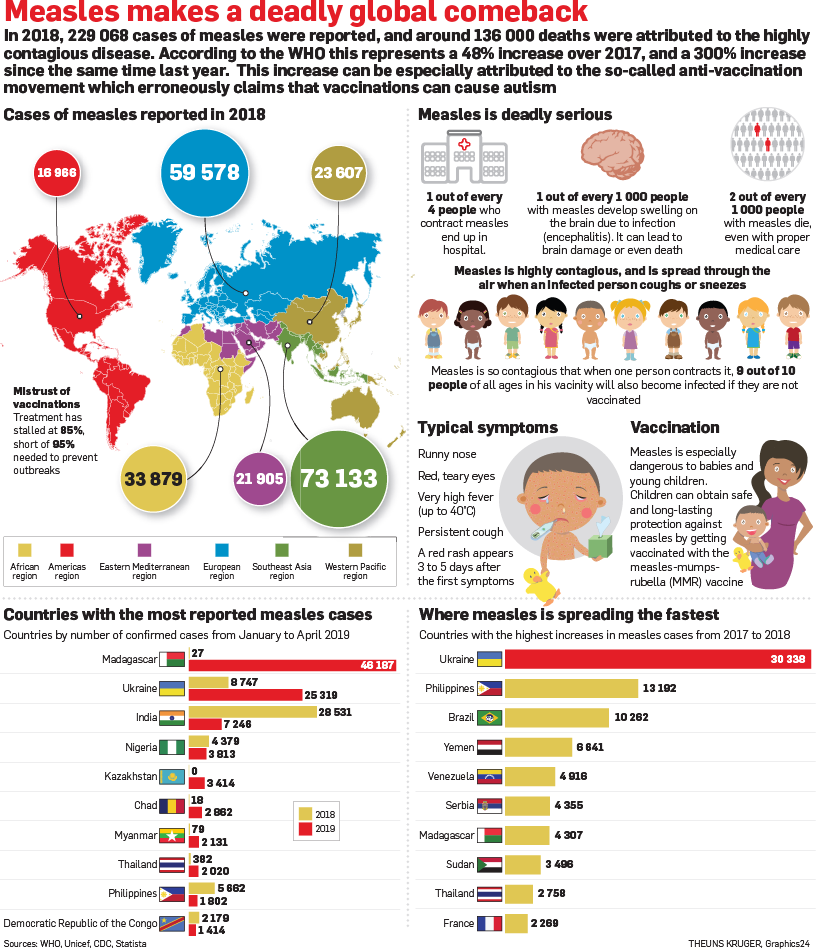
Complacency and misinformation are the leading causes of preventable viral child deaths across the world.
As parts of the world grapple with a resurgence in widespread outbreaks of measles – the once almost eradicated deadly infectious disease – fresh concerns have been sparked over whether South Africa could soon have a mass re-emergence of the disease.
This as the US fights to contain the 764 confirmed cases of measles in 23 states, which were recorded from January 1 until May 3 this year, and Europe is still trying to come to terms with more than 100 000 cases reported since last year, with 90 deaths related to the disease.
The National Institute for Communicable Diseases (NICD), South Africa’s public health institute that provides reference microbiology, virology, epidemiology, surveillance and research to support the government’s response to communicable disease threats, confirmed to City Press last week that there had been 11 laboratory-confirmed measles cases since the start of the year.
However, experts expect there to be a few measles cases each year in the country, and a number of response measures are taken for every case to prevent the disease from spreading.
“Measles cases are detected in South Africa throughout the year and there is usually an increase in cases during the last four months of the year,” said Dr Villyen Motaze, an epidemiologist at the NICD’s centre for vaccines and immunology.
In South Africa, a confirmed measles outbreak is declared when three or more laboratory-confirmed cases are detected over a four-week period in one district. The 11 cases did not constitute an outbreak as they were scattered in the time and places they occurred.
“There have been a number of measles outbreaks in South Africa in the past and the national health department collaborated with the corresponding provincial departments and the NICD to respond and control the outbreaks in a timely manner. The most recent measles outbreaks occurred in 2017 and affected three different provinces – Gauteng, KwaZulu-Natal and the Western Cape – resulting in 210 measles cases,” Motaze continued.
The last large outbreak in South Africa resulted in 18 000 cases between 2009 and 2011.
The latest available statistics from the World Health Organisation (WHO) indicate that in 2017 there were 110 000 measles-related deaths globally, mostly among children aged under five. This, despite there being a vaccine available, whose administration resulted in an 80% drop in measles deaths between 2000 and 2017 worldwide.
“Due to the roll-out of effective measles vaccines, there has been a steady decrease in measles cases all over the world since the 1970s. This drop in cases resulted in people not seeing measles cases. [However], in many areas, people have become complacent, forgetting the severe side-effects of measles infection, such as blindness, brain infection or death,” Motaze explained.
“People therefore neglect preventive measures such as vaccination. An increase in cases follows when vaccination coverage drops.”
Earlier this year, Wits professor of vaccinology Shabir Madhi explained to City Press that there was also an element of vaccine hesitancy among locals towards vaccinations in general, owing to various factors.
“In some communities this might have to do with misinformation about the possible harm of vaccines or a belief that vaccines are not important. The latter is often fed by the complacency that sets in after vaccines are highly successful in preventing illnesses and deaths, so parents become more complacent believing that it is no longer a threat.
“Then there are issues of parents being put off vaccines owing to a shortage of the vaccines at clinics, where they expected to return on another date, [a process that is both inconvenient and costly].”
Motaze reaffirmed the measles vaccine’s safety, saying there had been extensive research to show that there was no link between children getting the vaccine and developing autism, as is often believed among anti-vaccination circles.
“Unfortunately, inaccurate information about vaccines is still communicated to the public through irresponsible sources of information. Parents are encouraged to consult reliable resources such as the NICD and WHO.”
The first sign of the disease is usually a high fever, which begins about 10 to 12 days after exposure to the virus and lasts four to seven days. Patients also develop a rash on the face and upper neck.
The disease can lead to complications such as blindness, encephalitis (a viral infection that causes brain swelling), severe diarrhoea and related dehydration, as well as severe respiratory infections such as pneumonia.
According to the Centers for Disease Control and Prevention, the US national public health institute, the cases in the US were linked to travellers who brought measles back from other countries such as Israel, Ukraine and the Philippines, where large outbreaks of the disease were occurring.
Recently, a cruise ship owned by the Church of Scientology carrying 300 passengers was reported to have been quarantined off of the Caribbean islands after officials discovered a measles case on board.
Last week, Germany’s Minister of Health Jens Spahn submitted a bill for government’s consideration that included a fine of up to €2 500 (R40 000) for parents who didn’t vaccinate their school-age children against measles.
 |
| ||||||||||||
| |||||||||||||




 Publications
Publications
 Partners
Partners









